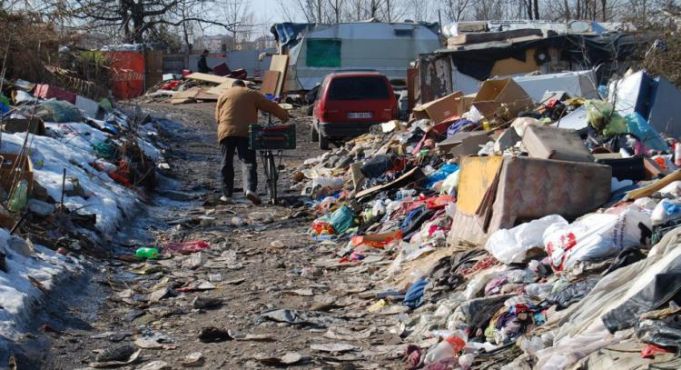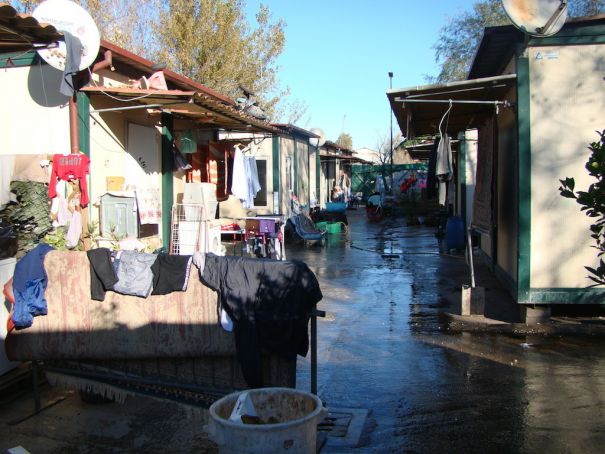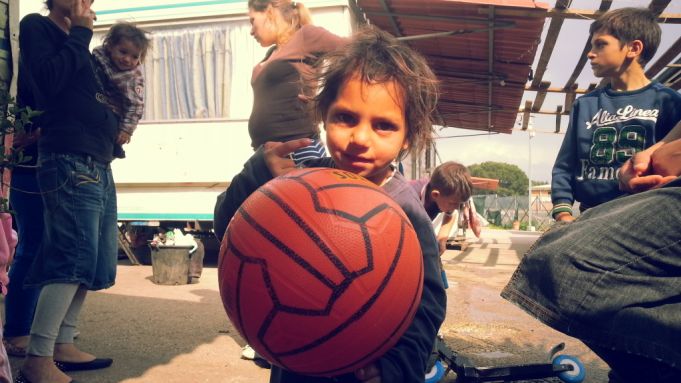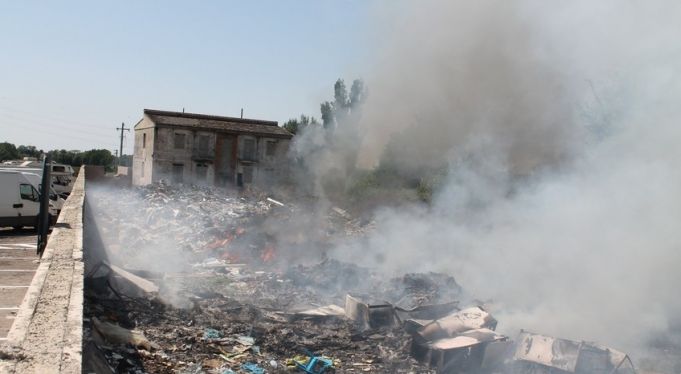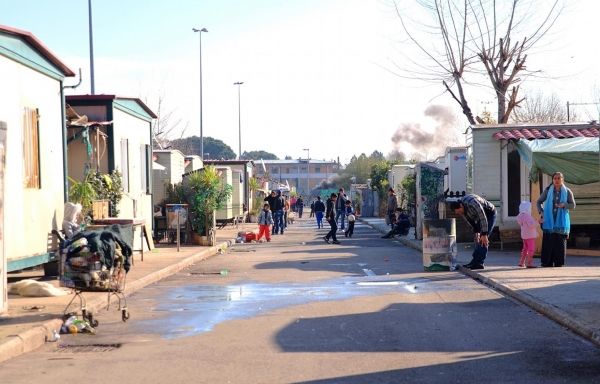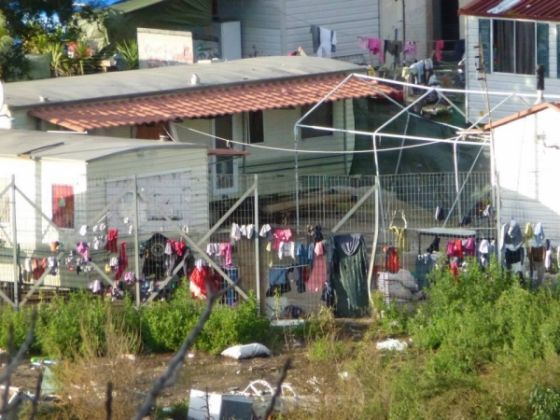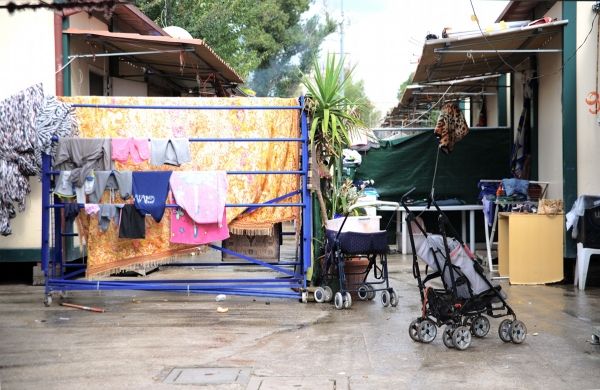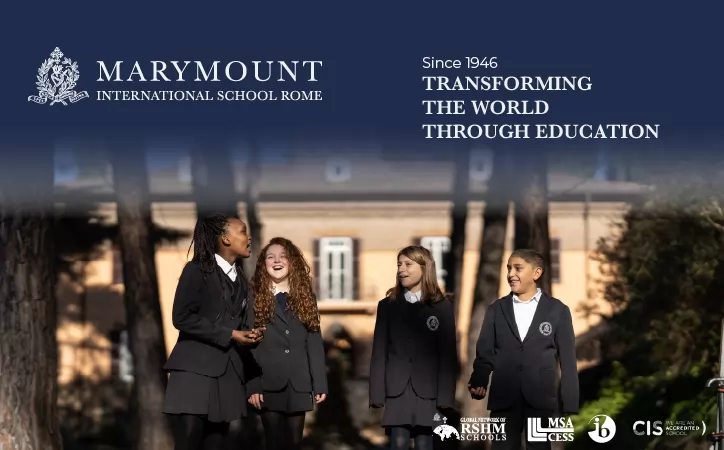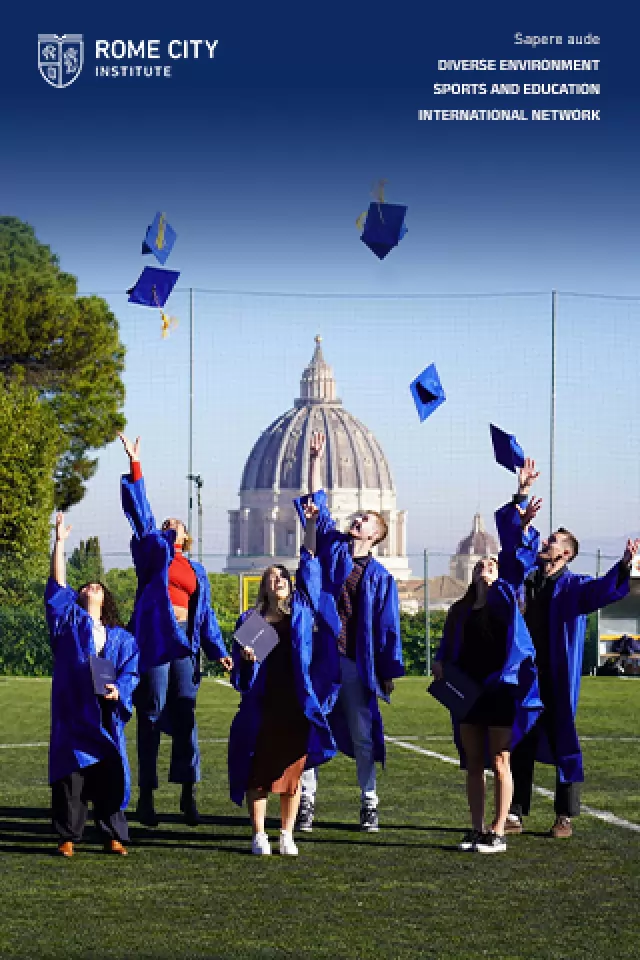Marginalised and forgotten, Roma children play football in dangerous conditions.
By Mike Dilien.
“Che c’è scritto?” the man yelled. “Che c’è scritto?” he repeated and pointed at the road signs I had ignored. What was written? Dangerous Road. And, admittedly, Private Property. I had been contemplating the panorama of a camp for Roma, bordered by a railway track and a road.
The site, built by the government, was Europe’s largest gypsy camp. “I give them home-grown vegetables and what do they give me? Dioxin,” the man said referring to the Roma who were burning waste on his land. He took me to the beginning of the private lane, where the Salone railway station ended. “Look, you are being watched,” he said indicating a camera.
Salone was a ghost station: trains no longer stopped there since commuters had complained about the Roma.
“The worst are not the adults,” the man said, “but the young.”
On Via di Salone, I had to cycle between cars and trucks – there was no space for pedestrians or cyclists. I passed a long metal fence with cameras on towering masts. At number 323, vans and pickup trucks bustled in a parking lot. I wanted to peep into the camp and entered the dirt track between the lot and the fence. But shouting youths in a van and a beefy adult on a Vespa stopped me.
“What are you looking for,” the adult asked blocking me.
The Salone camp had made headlines with ethnic conflicts, drug dealing and child prostitution. Since 1 July it was no longer under surveillance: the budget was exhausted, the guards had gone and the CCTV was no longer monitored.
“Stazione… treni… Termini,” I said, faking poor Italian and knowing that the dirt track led to the railway station.
“I’ll take you to the station. Leave your bike here,” he said.
“No, I can’t,” I said. “It’s not mine. I have to take it back.”
“Gimme €5 and I’ll show you.”
“I don’t have €5.”
He sighed. “Straight on, then turn right.”
I dawdled on. On my left, against a concrete wall, lay broken shoes, stained clothes, half-burnt plastic bottles, dismantled electrical appliances, broken furniture and burned-out wrecks of cars. On my right, toddlers peeped through the fence.
Suddenly a boy on a mountain bike rode beside me. “Follow me,” he said. We pedalled along the dirt track, between the puddles.
“Do you have school holidays?” I asked.
“School… yes.”
“No, holidays?”
“Holidays… yes.”
We slipped through a line of concrete blocks and crossed a field. Then, an iron gate led to the railway platform. We rode up to the building. I told the boy I had to return the bike to a place near Termini. A train whistled through the station at high speed.
“Are you a journalist?” he asked. “Giornalista calcio?”
“Eh… yes.”
“Do you live in a house?”
“I do.”
“Rich! You’re rich!”
“No, I’m not.” I said. “I just write an article and then hand it in.”
“Yes,” he said thoughtfully. “One has to do something.”
Another boy on a mountain bike arrived. He wasn't wearing a top and, with his wavy hair, was quite good-looking.
“A sports journalist,” the first boy explained.
“You can take the next train. Leave your bike here,” the newcomer tried. I refused. The boy then asked me if I were Romanian. I told him that I was Belgian and then asked where they came from. The boys were Bosnian Serbs.
They used to live in Casilino 900, a Roma camp in the Centocelle neighbourhood. There the boys went to school and had Italian friends. Then the authorities razed Casilino 900 and deported the inhabitants to Salone, 30 km from Rome and 3 km from a bus stop along a killer road.
About 375 of the camp’s 480 minors were enrolled in a school; only two of them made it to high school. I noticed that the first boy barely spoke since the second one had joined us.
“Do you play football,” I asked them. “In a team? A Bosnian team?”
They nodded. “Do you have a ball for us,” the good-looking boy asked. When I said I didn’t, he asked me for money to buy something to drink.
“Here’s €4,” I said. “Two for each of you. But don’t drink – ” “– whisky,” he said with a smirk as he rode off.
“I'm Mike,” I shouted after him. “What’s your name?” He turned and shouted “Francesco.” “But… that’s Italian?” “Of course it is.”
“And yours,” I asked the softly-spoken boy. He hesitated. “Diego.” “That’s Spanish,” I said.
“Yes,” he murmured and joined Francesco.
The following day I returned to the camp. At the entrance a small girl was sitting high up on the fence. She wore a white dress and had a large dark-blue bow in her hair. “What do you want?” she asked. I waved at her, said “Ciao” and rode on. Further down the track, a man and a woman were talking.
I addressed the man: “I’m looking for Diego and Francesco. They’re Bosnian. I have a football for them.” “Can I have the ball?” the man asked. “I’m afraid not: Diego and Francesco have helped me a lot.”
“Try the next large side entrance,” he said. A couple of metres further along stood the man who had blocked me the day before. He recognised me.
“Diego? A small boy? Follow me.”
Run-down containers stood crammed on a cement platform. Rats criss-crossed between them and sewage was leaking onto the ground. There had been cases of hepatitis. Deafening music filled the air. Although the camp was built for 600 people, it now housed more than 1,000. Up to 11 people shared a container. Many of the inhabitants suffered from respiratory difficulties and hypertension.
The first container belonged to Diego’s family. It appeared Diego was not his name, but something like “Djuro”. In no time a dozen half-naked and barefoot children surrounded me. Diego appeared. He looked surprised. “So you found the way back?” he asked in his soft voice.
“Here,” I said and gave him the ball. “It’s yours. And Francesco’s, but your's more.” He nodded.
All of a sudden I became aware that someone was sitting on the back of my bike. I turned and looked into the twinkling eyes of a young boy. He asked if I had a ball for him as well. I said that everyone having a ball wouldn’t make sense. Instead, everyone should team up and play with one ball.
Diego shot the ball against a container and looked approving. “Let’s go.” We walked to a spot in front of a hardboarded house where other kids soon joined us. They were Romanian. We improvised two goal posts: Bosnia would play Romania. I was to play with my Bosnian friends of course. Under a radiating sun and in high weeds we played football.
Close to the camp, an incinerator was spitting out fine particles – the level of palladium is twice as high here as in nearby regions; that of dioxin five to 20 times. Via di Salone’s mortality rate from tumours is 30 per cent higher than Rome’s.
I left after one game and fetched my bike. Behind the concrete wall, adults were burning waste. A couple of children standing inside the blackened frame of a wardrobe watched them silently. The area was a dump once; its soil now contained arsenic, pyrene, beryl and lead. Black, toxic fumes spread out towards the looming LNG storage terminal.
When I neared the entrance, the little girl on the fence waved at me. She was smiling. “Ciao!” she shouted. “Will you come back?”
The original of this article appeared in the November 2015 edition of Wanted in Rome.



